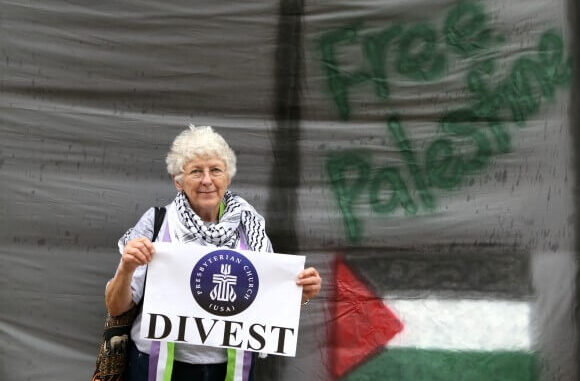
Estimated reading time: 8 minutes
“These are facts, this is not an opinion,” said Reverend Dr. Munther Isaac during an April panel on Christian zionism, referring to zionism’s genocidal reality. The talk, Confronting Christian Zionism, was a prelude to the 2024 General Assembly of the Presbyterian Church USA (PCUSA), which began June 30.
On Monday, July 1, the delegates of this million-member church voted to divest from “israeli” bonds, to pressure two corporations, Palantir and General Electric, to divest from the colony, and to pass a resolution to “reject Christian zionism in all its forms.”
Christian zionism, according to the April panel’s host Reverend Dr. Cynthia Holder Rich, is based on the idea that Jesus’s awaited return relies on Jews having power over the land of Palestine. This ideology, among other problems, conflates biblical Israel with the genocidal colony today. In a resolution just passed, PCUSA commits to “clarifying, in liturgy and through education, a basic distinction between biblical Israel and the modern State of Israel, in order to avoid a conflation of the two.” The panelists also went beyond clarifying the occupation’s name, clarifying that what has been called a “war” by western media is a genocide.
Reverend Dr. Munther Isaac, the first panelist, delivered a powerful analysis of the political nature of Christian zionism. “This is all possible by three inseparable factors, and those would be: coloniality, racism/supremacy, and theology,” said Isaac, who defines coloniality as “the coming together of economic, cultural, political, and military power that constitutes a system of domination led by powerful nations to protect and defend their own interests.” He went on to explain that “israel” is a settler colonial project within the U.S. Empire. “At the heart of this empire is this American exceptionalism, and it’s really, really hard to isolate zionism from American exceptionalism.” On the topic of U.S. responsibility, Dr. Isaac also condemned the war criminal Biden’s patronizing statements as having a “very elitist, racist attitude.”
The reverend stressed the role of Christian zionism in the U.S., arguing it is not a naive belief or reading of the Bible, as it’s often considered, but is in fact a Christian lobby that serves U.S. interests. Further, this imperialist politic is not limited to the farthest right wing, rather it infects the full spectrum of the Empire’s liberals. “Christian zionism is very, very strong, even among Christian liberals.” Rabbi Brant Rosen, another panelist, further clarified “‘Christian zionism’ specifically refers to a form of evangelical Christianity that has a very specific ideology that is millennarian and apocalyptic in nature, but there are plenty of Christians who are zionist.”
According to Reverend Isaac, statements from western churches demonstrate their service to empire. Churches, regardless of particular ideology, have toed the same genocidal line — that Hamas must be condemned as barbaric terrorists, that the occupation has the right to defend itself from those they brutally occupy, that violence against Palestinians is the fault of the Palestinians themselves — cynically accompanied with calls to pray for peace. One of PCUSA’s new resolutions expands on this complicity: “As much of the world watches in horror at the devastation and suffering, Christian zionist organizations use media such as religious music videos glorifying Israeli soldiers in action, online advertising, and televangelists to seek donations from Christians to keep funding and promoting the war.”
Individual Christians or churches are far from the only ones funding and promoting genocide. The occupation’s godfather, the U.S. Empire, profits massively from its investments in occupation, through the government, corporations, schools, and other institutions. Take General Electric, one of the corporations PCUSA will urge to divest from “israel” by threatening to pull the church’s $1 million in investments. G.E. supplies the colony with the aircraft engines that rain terror on the heads of sleeping Palestinians and with power infrastructure that enables settlers to comfortably expand their range of theft, rape, and murder.
Notably, the resolution to condemn, On Confessing our Complicity in Christian Zionism, still contains covert zionism in suggestions of an equivalence between Palestinians and their oppressors, as well as references to the occupation as one specifically occurring in the 1967 borders, conceding much of Palestine to the settlers.
Dr. Isaac, however, did not equivocate, stating that zionists displaced Palestinians when they first came to occupy the land, clearing the way by ethnic cleansing. “The Biblical case for Christian zionism is the Biblical case for apartheid, for settler colonialism and ethnic cleansing, because this is what zionism is… If we continue to support that as Christians, there is something wrong with the credibility of our Christian witness.”
Rabbi Brant Rosen brought an anti-zionist Jewish voice to the panel: “Evangelical Christian zionism, I believe, has very, very profound and important and troubling implications for the Jewish community.” He asserted that understanding zionism as uniquely Jewish denies the true history — zionism actually arose from European Christians in the 17th century. Today, not only are there more Christian zionists than Jewish zionists, there are more than all Jews in the U.S. Rabbi Rosen added that, religiously, mass return of Jews to Palestine before the return of the messiah has long been condemned by rabbis as “an anathema.” It was only after Christians dreamt of the displacement of Jews out of Europe and into Palestine that Europe’s Jews began taking up zionism in response to antisemitism.
However, the rabbi made clear that this response was not actually to free Jews from persecution, but a “Faustian bargain… to further imperial interests” in western Asia. “Zionism has always curried favor with antisemites, from the very beginning. One of the most obvious examples of this is the Balfour Declaration.” The Balfour Declaration legitimized the occupation and ensured Britain’s land-grab of a valuable Mediterranean coast. The same Balfour was the man who oversaw the 1905 Aliens Act, which closed the U.K.’s doors to Jews fleeing pogroms in Eastern Europe.
“This evangelical Christian zionist ideology is, at its core, an antisemitic one. I think this cannot be understated,” Rosen said. The Red Clarion previously reported greater detail of this antisemitic history in To Stop Marx, They Made Zion. By slicing Europe’s Jews into a superior and inferior race (“Jews” and “Yids,” respectively) Jewish zionists were able to cozy up to antisemites by sacrificing the Jews they considered lesser, particularly left wing Jews who threatened the interests of imperialism. Rabbi Rosen reiterated that zionism “wants to instrumentalize the Jewish people,” including a hope for the elimination of Jews through conversion to Christianity or by hellfire, “It has no interest in the wellbeing of the Jewish people.” The PCUSA resolution confirms, “About 1/3 of evangelical Christians in the U.S. believe that support for such actions from Israel will help hasten the desired end of the world. While most theologians consider it heresy, many Christians hold this far-right ideology.”
The final panelist Reverend Marietta Macy, a member of the PCUSA Israel-Palestine Mission Network’s steering committee, pleaded for broader commitment to education on the settler-colony. “[W]e have a strong history of uplifting education,” she began, “and not shying away when that education leads us to wrestle with really complex issues… Christian zionism and its relation to our U.S. policy and to how we relate to our siblings around the world is one of these issues.”
Macy spoke on the religious aspect of Christian zionism as being rooted in white supremacy and widely absorbed by Christians in the U.S. “This kind of dividing theology and excluding theology makes it impossible for us to recognize our place in God’s plan and damages our own view of ourselves,” she said. The reverend explained the difference she sees between “empire theology and Matthew 25 theology,” the latter of which calls on care for the hungry, sick, prisoners, and poor, while empire theology is one that “keeps people hungry and imprisoned, and sick and in need.”

